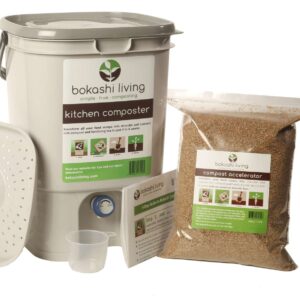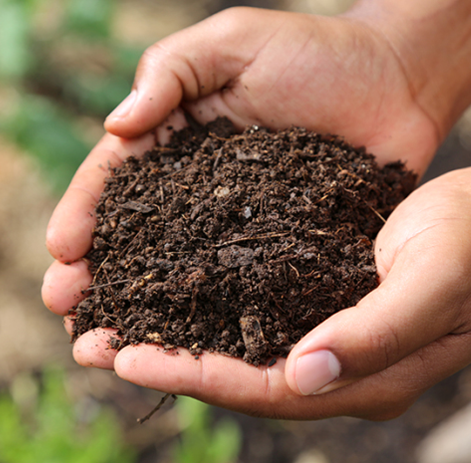When most people think about composting, they often think about black dalek style compost bins, or a trio of large wooden containers down at the end of the garden. But composting is much more than that. There are all kinds of methods available to convert organic waste into soil for your garden.
Here are four unusual ways to compost food waste. How many have you tried?
1. Bokashi composting
 If you’ve spent any time on this website, then you are hopefully (at least a little bit) familiar with bokashi composting. Bokashi composting uses specially selected microbes to ferment (or pickle) food waste. After burying the fermented food waste (or pre-compost) the waste will break down quickly and without attracting pests.
If you’ve spent any time on this website, then you are hopefully (at least a little bit) familiar with bokashi composting. Bokashi composting uses specially selected microbes to ferment (or pickle) food waste. After burying the fermented food waste (or pre-compost) the waste will break down quickly and without attracting pests.
Bokashi composting derives from Japanese farming practices from centuries ago. Food waste was covered with soils containing microorganisms which would ferment the food waste. A few weeks later, after fermentation was complete, the fermented food waste was buried.
Bokashi composting became more widely known in the 1980’s after the development and manufacture of EM1 (Essential Microorganisms). These microbes are in our premium bokashi bran.
2. Vermicomposting
Secondly, vermicomposting. Vermicomposting (or worm composting) is simply the process of using worms to break down your food waste and organic matter. Obviously, vermicomposting has been happening in nature as long as there have been worms and organic matter for them to eat. Mary Appelhof developed the idea of home vermicomposting in the early 1970’s. Since then, vermicomposting has grown to a fairly well-known form of home composting.
3. BSF compost
 BSF or black soldier fly composting is similar to vermicomposting in that the larvae of black soldier flies can be added to sealed compost bins to eat and break down food waste. The larvae can live for several weeks and during that time will devour lots of food waste. The black soldier flies are harmless and do not pester humans. The flies actually don’t eat during their short lifespan so won’t spread pathogens by landing on your food.
BSF or black soldier fly composting is similar to vermicomposting in that the larvae of black soldier flies can be added to sealed compost bins to eat and break down food waste. The larvae can live for several weeks and during that time will devour lots of food waste. The black soldier flies are harmless and do not pester humans. The flies actually don’t eat during their short lifespan so won’t spread pathogens by landing on your food.
Alternatively, you can take advantage of these great natural (free!) composters by attracting them to your garden or compost pile. I’ve noticed an increase in black soldier fly larvae in the last couple of years since adding my bokashi pre-compost to my garden. As with any living thing, black soldier flies are interested in breeding and finding the perfect home for their offspring with lots of readily available food. By adding food waste to your garden or compost pile you are providing a great home for the black soldier flies; they will come. Some people believe they are particularly fond of coffee grounds.
4. Blatticomposting
So, you may have heard of the first 3… but this term is likely new to many of you. Blatticomposting is using cockroaches to eat kitchen leftovers.
Cockroaches are excellent composters; they are not fussy and will eat almost anything. Plus, they are pretty hard to kill and they reproduce like crazy. And they do all this whilst creating very little smell. Fantastic…. assuming you (your family and your neighbors) can accept the large bin of cockroaches in your back yard.


How would the feeding process look exactly if a person wants to incorporate Bokashi composting along with vermicomposting, Blatticomposting, and BSFL composting?
If one wanted to compost using those 4 methods, would one use the Bokashi compost to feed the BSFL first, then use the BSFL compost to feed the roaches, then use the blatticompost for the vermiculture?
How wwould you do that? Theoretically…
Thanks for the question. If you wanted to compost food waste using all four methods, you definitely could, but I’m not sure what the benefits would be to composting the material through all 4 methods. I don’t have first hand experience of blatticomposting or BSFL composting, but there is unlikely to be much value in adding the worm castings to either of these systems. Probably the best way to incorporate these systems would be to feed the bokashi pre-compost directly to your vermicompost, blatticompost and BSFL compost. That would allow you to compost larger volumes of food waste as the 3 systems would very rapidly break down the bokashi pre-compost.
Hope that helps and would love to hear how you get on. Happy composting 🙂